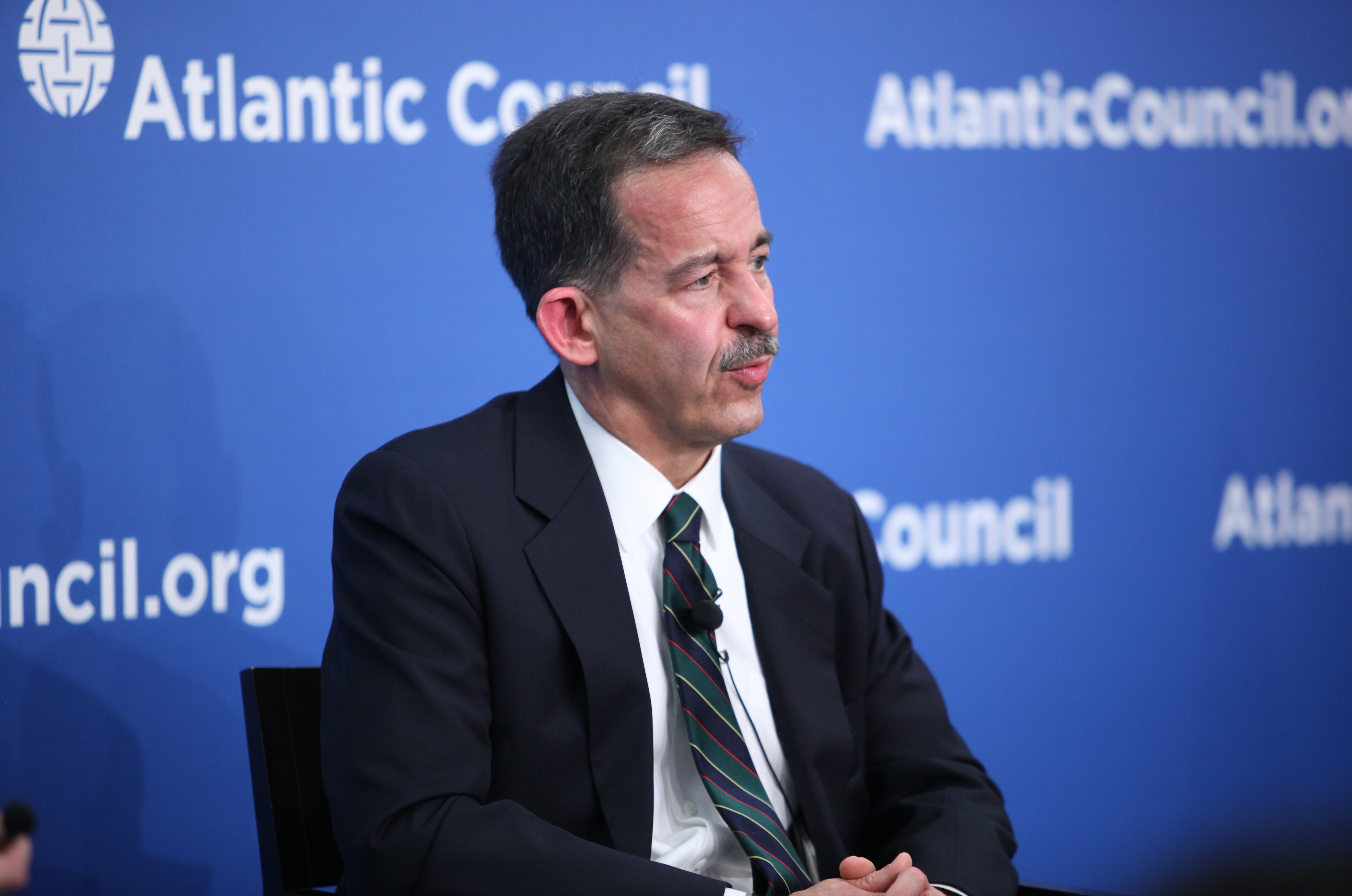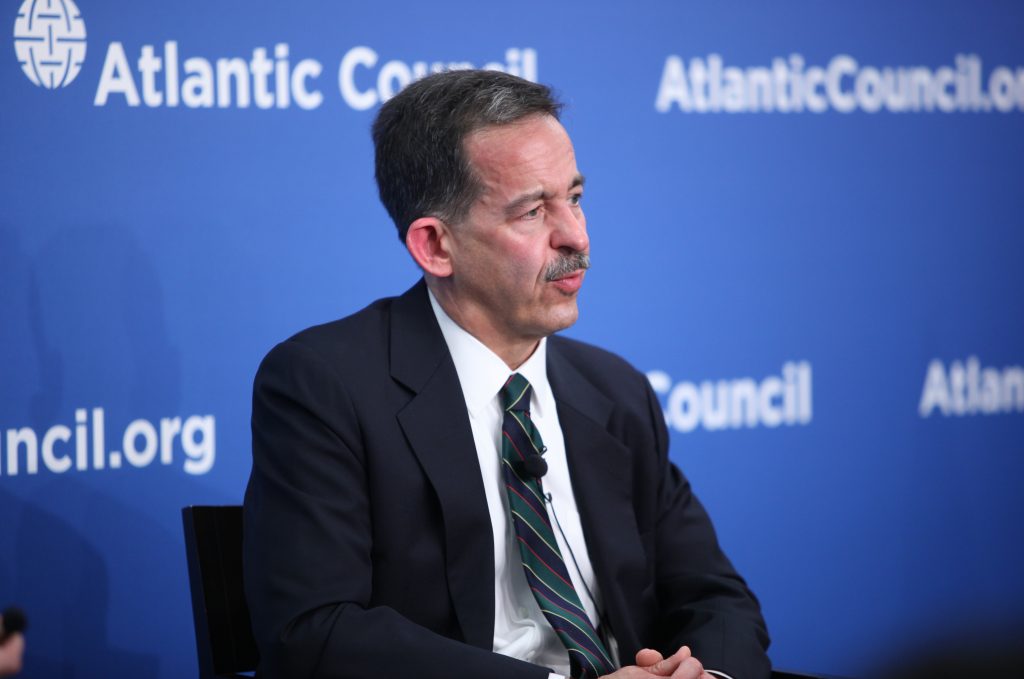
Timing of sanctions relief in Iran’s control, says State Department’s lead coordinator for deal’s implementation
Iran is implementing its commitments under a nuclear agreement at such a swift pace that it is creating a challenge for the verification process to keep up, the State Department’s lead coordinator for implementation of the deal said at the Atlantic Council on December 17.
Iran’s government has said it will complete by mid-January all the commitments it made in the Joint Comprehensive Plan of Action (JCPOA) that was finalized in July with the P5+1 countries—the United States, the United Kingdom, Russia, China, France, and Germany.
“The fact that they are doing it rather quickly than many expected, I think we have a challenge to make sure that every step is verified perfectly,” said Stephen Mull, Lead Coordinator for Iran Nuclear Implementation at the US Department of State.
“There are a lot of moving pieces that we will have to stay on top of in the coming weeks,” he said. This includes ensuring that the expected shipment out of Iran of 25,000 pounds of enriched uranium is done in a safeguarded manner; that the plutonium heavy water reactor at Arak is disabled as promised by Iran; that the United Nations’ nuclear watchdog, the International Atomic Energy Agency (IAEA), has access to all of Iran’s nuclear facilities; and that the centrifuges used to enrich nuclear material are put in storage.
“Any one of these is an easy thing to verify,” said Mull. “Having it all happen at once is going to require a lot of attention, especially from the IAEA, but also from us in our oversight capacity.”
Mull spoke at a daylong conference hosted by the Atlantic Council and the Iran Project in Washington.
Future of sanctions
Once the IAEA has verified Iran’s compliance with its commitments under the nuclear deal, the United States, the European Union, and the United Nations Security Council will lift sanctions that were imposed in response to the Islamic Republic’s nuclear program.
The Associated Press reported on December 17 that the Obama administration was considering lifting some of these sanctions as soon as January. After the IAEA verifies Iran’s compliance, “and only at that time,” will Iran receive sanctions relief, said Mull.
“The timing for reaching implementation day is primarily within Iran’s control,” he said. “We really can’t predict when it is going to occur. It is up to them to perform all of the tasks they committed to do and it is up the IAEA to verify that they have done so beyond a shadow of a doubt.”
Mull noted that Iran has made tangible progress toward meeting these commitments. For example, it has already removed more than 5,000 of its over 19,000 centrifuges and put them in storage under IAEA surveillance, and is likely to remove the rest within the coming weeks. Iran has also reduced its stockpiles of enriched uranium. Iran is expected to ship around 25,000 pounds of low-enriched uranium to Russia by the end of December. It is also expected to fill the core of the Arak reactor with concrete, thereby rendering it inoperable.
On December 15, the IAEA’s Board of Governors agreed to close the file on Iran’s past nuclear activities after the Agency concluded that Iran had been working toward developing nuclear weapons until late 2003, but found no evidence that this activity continued beyond 2009. This action puts Iran one step closer to sanctions relief.
The IAEA simply “confirmed what we and the rest of the international community has long known” about the possible military dimensions (PMD) of Iran’s nuclear program, said Mull.
Ballistic missile test
Iran tested a ballistic missile in October that US officials said was in violation of UN Security Council resolutions.
Mull, who testified to the Senate Foreign Relations Committee earlier on December 17, said Senators had expressed concern that the absence of a swift response to the missile launch, the detention of Americans in Iran, and Iran’s support for Syrian President Bashar al-Assad had “created an atmosphere of permissiveness.”
“We don’t agree with that” assessment, he said, noting that the Obama administration is actively considering consequences for Iran’s missile test.
Under the terms of the JCPOA, Iran has the right to withdraw from the agreement if previously lifted sanctions are reimposed.
Would action at the UN Security Council, as the Obama administration has sought, specifically sanctions on Iranian individuals in response to the ballistic missile test, be seen by the Iranians as “the old sanctions back in new clothing,” wondered Thomas Pickering, a former US Undersecretary of State who moderated a discussion with Mull.
The P5+1 countries have been clear throughout the negotiating process that sanctions relief is specifically focused on the nuclear program. It does not imply a softening of any intent to apply other sanctions in response to missile launches, acts of terrorism, human rights abuses etc., said Mull.
Sanctions imposed on Iran in response to its nonnuclear activities will remain in place. This will prevent US companies from doing business with Iran’s government and complicate European efforts in this regard. This has led to expressions of concern, especially among EU states.
In an attempt to alleviate at least some of these concerns, the Obama administration is putting together a guidance that will clarify what business is permitted once the nuclear sanctions are removed.
“Once we get a few weeks or months under our belt, people will get a clear idea of what they are allowed to do,” said Mull, adding that the US government is not looking to block legitimate business activity.
Visa-waiver legislation
Following the Nov. 13 attacks in Paris, which were carried out by terrorists who were European citizens, US lawmakers have sought to amend the visa-waiver program. The program allows the citizens of participating countries—mostly from Europe—visa-free travel to the United States for a period of ninety days.
The House of Representatives on December 8 passed legislation that would bar citizens of Iran, Iraq, Sudan, and Syria or those who have visited those countries in the past five years, from traveling to the United States without a visa.
All the parties to the JCPOA agreed that they would not take actions intended to disrupt economic activity that would be permitted in Iran after the sanctions are lifted. Iranians, as well as Europeans, are complaining about the legislation in Congress, said Mull.
Reassuring Israel and the GCC
Israeli Prime Minister Benjamin Netanyahu is a strident critic of the nuclear deal with Iran. His concerns are shared by many Arab Gulf states that worry about the deal’s impact on the strategic balance in the Middle East.
“Since the JCPOA survived the congressional review process… [senior Israeli officials] have signaled to us at a very high level that they would like to work with us in making sure that the implementation is effective,” said Mull.
As is the case with Israel, the United States is “very sensitive” to the security needs of the Arab Gulf countries, said Mull. “We view very much in our interest, as we go forward with this deal, that we continue to bolster the security, improve the ability of our friends to deter potential aggression from Iran through expanded security assistance program that we are discussing with the [Gulf Cooperation Council] states as well as with Israel.”
Ashish Kumar Sen is a staff writer at the Atlantic Council.
Image: The fact that Iran is swiftly implementing its commitments under a nuclear agreement has created a verification challenge, Stephen Mull, Lead Coordinator for Iran Nuclear Implementation at the US Department of State, said at the Atlantic Council in Washington on December 17. (Atlantic Council/Victoria Langton)
